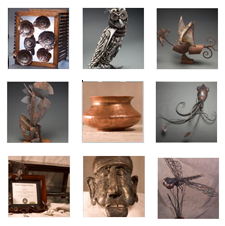Frequently Asked Questions
Q: How do I get into the Welding Program at ACC?
- A: To begin taking college credit welding classes at ACC, you must first apply to the college by completing the admissions process and all associated requirements. When you are eligible to register for college credit classes, you can also register for welding classes; there are no additional requirements to begin welding technology classes at ACC.
Q: What if I didn’t graduate from high school?
- A: If you do not have a high school diploma or a GED, you can get “special approval” to be admitted to ACC. See here for details.
- But wait, there’s more! ACC’s “Ability to Benefit Program” offers free classes, books, supplies, and a Metro Green Pass to students who qualify.
Q: What if I just want to learn some welding for a hobby or for personal interest?
- A: For hobbyists and do-it-yourselfers we offer Continuing Education courses at the Riverside Campus. Each semester we offer Basic Shielded Metal Arc Welding and Intermediate Arc Welding. These classes do not apply toward college credit certificates and degrees.
Q: What class(es) should I start with?
- A: In general it is best to take classes in the order listed on the award plan that applies to your goals. You may begin with any course that does not have a prerequisite. You must take courses in order based on prerequisites (see the Code Welding Prerequisite flowchart and Art Metals Awards flowchart). Please contact us if you would like additional guidance.
Q: I can’t get into the classes I need because they are full. What can I do?
- A: The Welding Department cannot overload classes for safety reasons and because of limitations on available equipment.
- You may add yourself to the wait list for a course if all seats are full when you are eligible to register. If a seat becomes available, the first person on the wait list will receive an email in their ACC student email account alerting them that they have an opportunity to register, and must do so by the deadline stated in the email.
- Be aware of tuition payment deadlines, when students who have not paid tuition (or made arrangements with the college) will lose their seats. You may be able to get a seat if someone else is dropped.
- …Tuition Payment Options…Tuition Payment Plan…Financial Aid…
Q: Where are Welding and Art Metals classes taught?
- A: All Art Metals, Continuing Education, and Welding Inspection classes are currently taught at ACC’s Riverside Campus in Building C. Technical welding courses are offered at both the Riverside and Round Rock Campuses.
Q: How much does it cost?
- A: Tuition and fees at ACC are charged per credit hour based on the student’s residency status. Most welding classed are four credit hours each. In addition to tuition and basic fees, welding classes are subject to a $1 insurance fee and a $50.00 course fee per class (subject to change at any time). See here for the cost of entire degrees and certificates.
Q: What equipment will I need?
- A: Protective clothing, eyewear, gloves, and hearing protection are required for all welding classes, and it is preferred that you bring these to the first day of class. In addition, each course syllabus includes a full list of equipment required for that course. Click here to see the required tools and supplies list for each course.
Q: How do I become a certified (qualified) welder?
- A: To become a certified welder through ACC, you will proceed through a sequence of Shielded Metal Arc Welding (SMAW) courses leading to the capstone experience Welder Qualification course. View the flow chart outlining the required courses.
- If you are interested in becoming a certified welder without going through ACC’s courses, you should contact an independent testing facility or certified welding inspector who can administer the proper testing.
Q: How do I earn a certificate or a degree?
- A: To earn a certificate or degree you must complete the list of courses required for that particular award (see Award Plans for details). During the semester when you are taking the last course(s) required, you will apply for graduation. This must be done by the Graduation Application Deadline for that semester in order to graduate at the end of that semester; otherwise the award will be granted the following semester, provided all requirements are met (see the academic calendar for dates).
Q: How do I graduate?
- A: The procedure for graduating with an Associate’s Degree is the same as for earning a Certificate. You can earn certificates on the way to earning an associate’s degree, so remember to apply for them as you earn credits!


